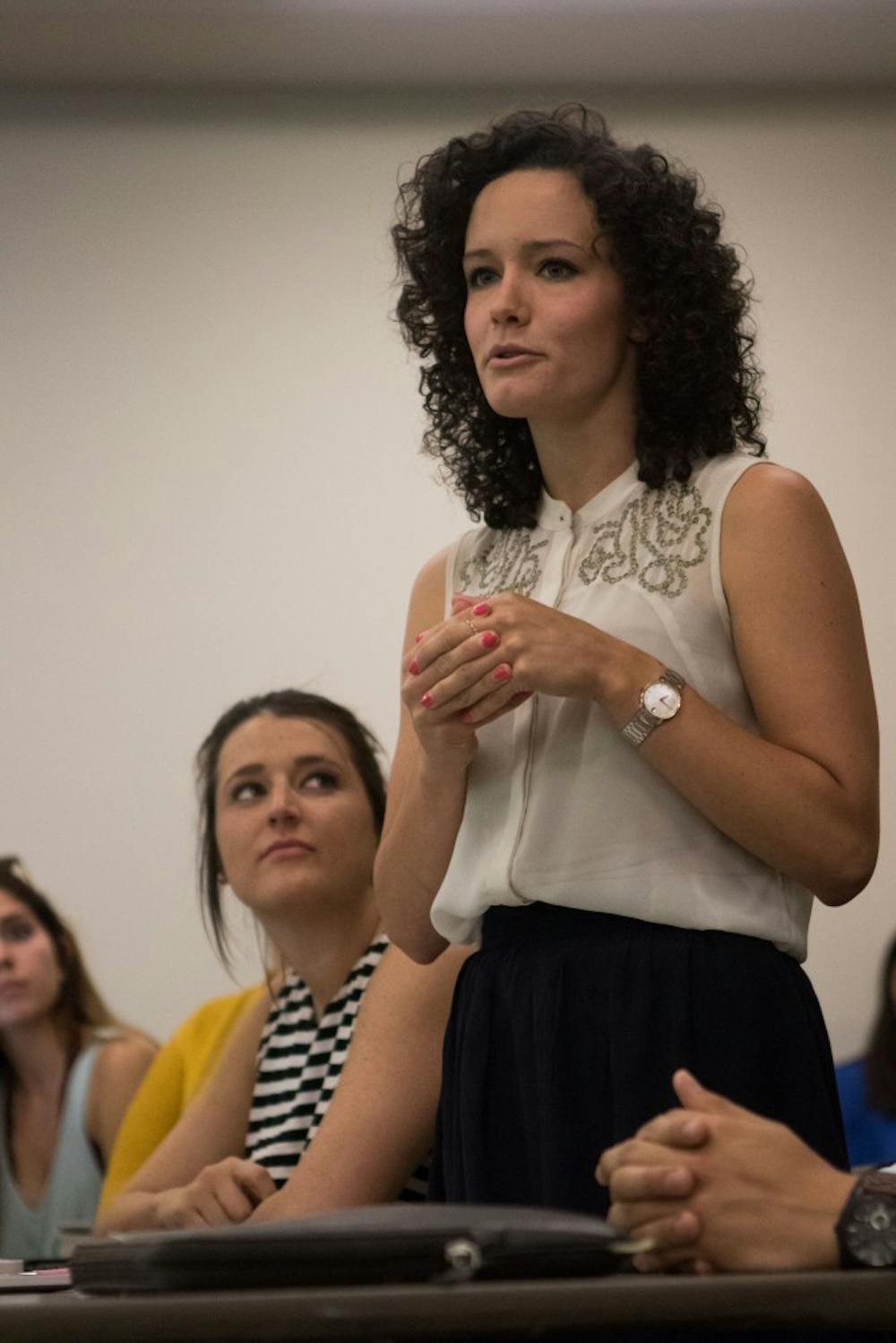After Tempe Undergraduate Student Government Senate initially passed a bill that would have allowed the University to formally recognize the Armenian Genocide, the bill was indefinitely tabled at its Tuesday meeting because the bill was outside of their jurisdiction.
S.B. 80, which would have required every school calendar to mark the anniversary of the Armenian Genocide and invite a guest speaker to commemorate the day, was passed by the Senate on April 7 and vetoed by outgoing Tempe USG President Cassidy Possehl on April 10.
Possehl said she vetoed the bill on April 10 because she felt it would cause more harm than good.
“While we are able to involve ourselves in controversial issues, the times that the government is best to do so, is when it has a reasonable assuredness that it will have an impact,” she said at Tuesday's USG Senate meeting. “Commenting or voting on issues such as this one does not only create real conflict and divisiveness within the organization and larger student body, but the actions that we can take by doing so are unfortunately limited.”
The Armenian Genocide occurred during World War I, where as many as 1.5 million Armenian citizens were killed by the Ottoman Empire in present-day Turkey. The 100th anniversary of the genocide, also called the Armenian Holocaust, will be recognized worldwide on April 24.
Twenty-three countries officially recognize the massacre as a genocide, including Russia, France and 43 states in the U.S. The Turkish Government continues to deny the 1915 events.
Possehl said the decision was not taken lightly, but considered USG’s mission and purpose, which is centered around student issues at the university, local and state level.
“While I recognize that students at ASU have heartfelt investments in a large range of topics outside of this scope, in order for our governing body to effectively represent students and their needs within the University and state, our focus must be within,” she said.
Finance senior Tro Panosian, whose great-grandparents and grandparents survived the attacks, has been actively in support of S.B. 80 and spoke on his feelings about the bill at the April 7 Tempe USG Senate meeting, where the bill was originally passed with a unanimous vote.
“This bill is fundamentally different from political bills," he said. "It’s a resolution looking honestly at the past and honoring human rights for all victims of persecution on our campus. As an academic institution, we have a responsibility to uphold values of truth, justice and honesty and to view bills on a case-by-case basis rather than stereotyping for the sake of laziness or indifference.”
Panosian, who is in Armenia to commemorate the 100th anniversary, said he believes the Armenian Genocide is a clear fact, especially because it was taught in various history courses at ASU.
Student government leaders were elected to stand up for the students who voted them into office and they should have the guts and courage to follow their hearts when the time calls for it, rather than abstaining to avoid conflict, Panosian said.
“At what point, as people, as a student body, do we stand up for what is right rather than caving to political expediency?” he said. “They were elected to represent student voice. The government fails to recognize that we have a right to come together and recognize for the sake of moral rightness to fulfill responsibility."
Panosian said S.B. 80 brought students from all different walks of life together, including Armenian, LGBTQ, Jewish and female students, all of whom advocated for the formal recognition of the event.
"At a certain point, if student government isn't able to confront truths, they are not credible for the power we gave them requires tremendous maturity and critical thinking," he said. "To call into question this precedence is gravely insulting."
Many high-ranking officials, such as President Barack Obama and Pope Francis, have received public backlash for their choice in words while addressing the Armenian Genocide. Obama has avoided using the term “genocide” during his time in office to describe the events, though the use of the term was included in his 2008 presidential campaign.
Members of the Turkish Student Association at ASU have said they are concerned about the bill. Economics graduate student Dilsat Tugba Dalkiran, the organization’s president, said he believes USG acted irresponsibly by ignoring the viewpoint of Turkish students before passing through this bill.
“Considering the fact that defining 1915 events as a genocide is still an internationally controversial issue, it should not be Student Government's job to support one idea against the other without any expertise on it,” he said in an email. “Student Governments exist to improve the student lives in the campus. However, supporting one ethnic group over another about an internationally controversial issue is nothing but decisive.”
Dalkiran also addressed his concerns in a letter directed to USG, highlighting the 1973 assassinations of Mehmet Baydar and Bahadır Demir in Los Angeles and stating USG is not qualified to recognize such an event.
“As a Turkish student group at ASU, we are very concerned about the ongoing bullying and intimidation targeting fellow Turkish students and Turkey over this issue at this and other campuses across the United States,” he said. “Thus, the ASU Undergraduate Student Government Senate is not only unqualified to draw conclusions about the debated history which affects both Armenian and Turkish students on campus, but any such decision may be irresponsible and have dangerous consequences.”
Although Tempe USG is not able to get directly involved in issues such as these, Possehl said they are more than willing to assist students and provide them with the necessary channels to succeed in bringing these discussions up.
“Recognizing the institution's mission for education of its students, I wholeheartedly urge invested students to find space and time for thoughtful discourse and educational programming to enrich the knowledge of all students at ASU on the subject,” she said. “While USG should not directly be involved in these issues and others outside of the purview of the organization, we have extensive infrastructure to provide resources to any students who wish to bring knowledge of any subject to our community. As we always have, we open our office to aid any groups that are passionate enough to independently organize others around a cause.”
Reach the reporter at Jlsuerth@asu.edu or follow @SuerthJessica on Twitter.
Like The State Press on Facebook and follow @statepress on Twitter.




